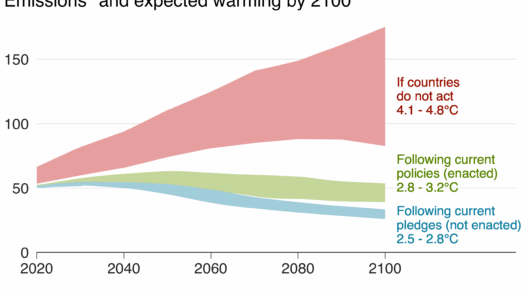Natural gas has often been promoted as a cleaner alternative to other fossil fuels, particularly coal and oil. But when we ponder the question, “Do natural gas power plants affect global warming?” we find ourselves confronted with a multifaceted challenge that requires a careful examination of numerous factors.
The combustion of natural gas primarily emits carbon dioxide (CO2), a greenhouse gas that is a significant contributor to global warming. Yet, natural gas power plants are cited for their lower emissions compared to coal plants. While it’s true that natural gas emits about 50% less CO2 than coal when combusted for electricity generation, the overall environmental impact is far more complex. Are we merely shifting the burden of atmospheric pollution, or are we genuinely advancing towards a more sustainable energy future?
One critical aspect to consider is methane leakage. Natural gas primarily consists of methane (CH4), a greenhouse gas that is over 25 times more potent than CO2 in terms of heat-trapping ability over a 100-year period. Methane escapes during various stages of natural gas extraction, production, distribution, and storage. A spike in methane emissions can significantly diminish any perceived benefits of burning natural gas instead of coal. Data suggests that the cumulative impact of methane could negate as much as 80% of the climate benefits provided by the reduced CO2 emissions from natural gas power plants.
Moreover, the environmental footprint of natural gas extraction raises ethical considerations. Hydraulic fracturing, or fracking, a common method for extracting natural gas, entails substantial disruptions to local ecosystems. The process consumes vast amounts of water, which, when contaminated, threatens the local fauna and flora, and potentially jeopardizes the supply of potable water for nearby residents. Thus, one must question: Is the short-term gain of lower electricity prices worth the long-term degradation of our ecosystems?
Transitioning to natural gas can also present a substantial hurdle in our quest for sustainable energy. While natural gas plants can be optimized to accommodate renewables through flexible power generation, they can inadvertently lock in carbon emissions in the energy infrastructure. This is a classic example of sticking with the “devil you know.” By continuing to invest in natural gas, resources that could be channelled into true renewables, such as wind, solar, or hydroelectric power, are diverted. This lingering reliance poses a risk for tomorrow’s energy landscape, making it harder to phase out fossil fuels altogether.
Another crucial point of discussion is the potential economic aspect: the so-called ‘bridge fuel theory.’ Proponents argue that natural gas serves as a transitional fuel, enabling a gradual shift from coal to renewable energy sources. However, the reality is that investments tend to solidify the status quo rather than encourage innovation in cleaner technologies. Are we not merely forging a path that leads us back into the darkness of dependency on fossil fuels?
Moreover, a comprehensive evaluation of the life-cycle emissions from natural gas plants reveals additional layers of complexity that raise eyebrows. This includes not only direct emissions from combustion but also indirect emissions from upstream activities like extraction and transportation. A study may show that even doubling down on natural gas could incrementally contribute to atmospheric changes beyond what policymakers might expect. Hence, one can pose a challenging inquiry: Are we truly prepared to absorb the potential repercussions of our energy choices?
In considering natural gas within the broader context of global economic and environmental goals, it may appear contrary to navigate from a clean slate backed by comprehensive renewables to a relentless pursuit of a fossil fuel that continually diminishes our aspirations to combat climate change. Countries that are showing promise in achieving carbon neutrality are often less invested in natural gas, instead prioritizing renewable energy technologies. Assuredly, the ambitious objectives like those in the Paris Agreement do not countenance any room for fossil fuels—neither explicitly nor implicitly.
Furthermore, the geopolitical implications of natural gas production and consumption cannot be overlooked. Nations rich in natural gas reserves often wield considerable power over global energy markets, which can lead to conflict and economic instability. Owning and managing these resources can entrench inequality, particularly when poorer nations become beholden to more powerful exporters. Asking the question ‘Do we truly want our global energy dependency tied to natural gas?’ finds a place in assessing not just environmental sustainability but also geopolitical stability.
Ultimately, the question of whether natural gas power plants affect global warming does not lend itself to an easy answer. The debate hinges on numerous variables—economics, sustainability, technological advancements, and ethical considerations surrounding environmental justice. Striking a balance between current energy demands and future climate goals remains critical, and while natural gas may contribute to transitioning away from coal, one must remain vigilant. Are we championing an energy system that also champions our climate, or merely laying a path that continues to threaten it?
As we look toward the future, the pressing endeavor is to catalyze conversations aimed at developing alternative solutions to clean energy without the inherent pitfalls of fossil fuels. Avoiding pitfalls and embracing innovation will be pivotal in determining whether we can indeed stop global warming in its tracks.






